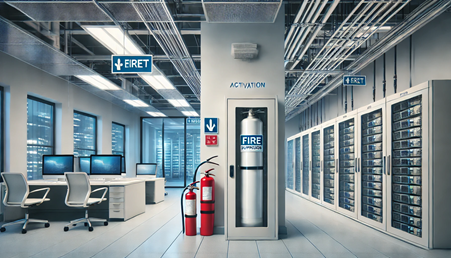
Fire safety is a critical concern for businesses of all sizes. Whether you operate a small retail store, a large industrial facility, or a data center, having an effective fire suppression system can mean the difference between a minor incident and a catastrophic loss. Choosing the right fire suppression system requires careful consideration of your business environment, fire risks, and regulatory requirements. In this article, we will explore different types of fire suppression systems, their applications, and how to determine the best option for your business.
Understanding Fire Suppression Systems
A fire suppression system is designed to detect and extinguish fires before they can cause significant damage. Unlike standard fire extinguishers or sprinkler systems, fire suppression systems often use specialized agents to control fires in environments where water alone may not be effective or could cause additional harm.
There are several key types of fire suppression systems, each suited to specific business needs:
- Water-Based Fire Suppression Systems
Water-based fire suppression systems, including sprinkler systems, are among the most common and cost-effective solutions for general fire protection. These systems work by releasing water when a fire is detected, cooling the flames and reducing heat.
Best for:- Office buildings
- Retail stores
- Warehouses
- Hotels and residential buildings
Limitations:
- Not suitable for electrical fires
- Can cause water damage to sensitive equipment and materials
- Gas-Based Fire Suppression Systems
Gas-based suppression systems use inert or chemical gases to extinguish fires without causing water damage. These systems remove oxygen or disrupt the chemical reactions required for combustion.
Types of Gas Suppression Systems:- Clean Agent Systems (FM-200, Novec 1230) – Quickly suppress fires without leaving residue, making them ideal for sensitive environments.
- Inert Gas Systems (Argon, Nitrogen, CO₂) – Reduce oxygen levels to suppress fire without damaging equipment.
Best for:
- Data centers
- Server rooms
- Museums and archives
- Telecommunications facilities
Limitations:
- Can be expensive
- Requires proper room sealing to be effective
- CO₂ systems can be hazardous to personnel in enclosed spaces
- Foam-Based Fire Suppression Systems
Foam-based suppression systems use a water-based foam solution to smother fires, cooling the flames and preventing the fire from spreading.
Best for:- Industrial facilities
- Warehouses storing flammable liquids
- Aircraft hangars
- Chemical plants
Limitations:
- Not suitable for electrical fires
- Requires proper drainage and cleanup after activation
- Powder-Based Fire Suppression Systems
Dry chemical powder systems use specialized powders to interrupt the chemical reaction of a fire, effectively smothering it.
Best for:- Industrial sites with flammable materials
- Manufacturing plants
- Paint booths and automotive repair shops
Limitations:
- Leaves residue that may require extensive cleanup
- Can be corrosive to certain materials
- Hybrid Fire Suppression Systems
Hybrid systems combine different suppression agents, such as water mist with clean agents, to offer more effective fire protection in specialized environments.
Best for:- High-risk industries that need multi-layered protection
- Businesses looking for environmentally friendly solutions
Limitations:
- Can be complex and costly to install
Factors to Consider When Choosing a Fire Suppression System
To determine the best fire suppression system for your business, consider the following factors:
- Type of Business and Fire Risks
Assess the fire hazards present in your business. For example:- Restaurants face high risks of grease fires, requiring kitchen-specific suppression systems.
- Data centers need fire suppression solutions that protect sensitive electronic equipment.
- Warehouses storing flammable liquids require foam-based systems.
- Building Size and Layout
Larger buildings with multiple floors may need integrated fire suppression systems, while smaller spaces might only require localized suppression solutions. Consider how a system will be installed and maintained within your space. - Regulatory Compliance and Industry Standards
Fire safety regulations vary by industry and location. Ensure your fire suppression system meets local fire codes, OSHA (Occupational Safety and Health Administration) standards, NFPA (National Fire Protection Association) guidelines, and insurance requirements. - Cost and Maintenance Requirements
While initial installation costs are important, ongoing maintenance is also a factor. Some systems, like gas-based suppression, require periodic refilling and testing, while water-based sprinklers require regular inspections. Choose a system that fits your long-term budget. - Environmental Impact
Some fire suppression agents, like Halon, have been phased out due to environmental concerns. Consider eco-friendly options such as Novec 1230 or inert gas systems that have a lower environmental impact.
Installation and Maintenance Best Practices
Once you’ve chosen the right fire suppression system, proper installation and maintenance are crucial for effectiveness.
Installation Best Practices:
- Work with certified fire protection professionals to design and install the system.
- Ensure the suppression system integrates with existing fire alarms and detection systems.
- Train employees on fire safety procedures and how the system operates.
Maintenance Best Practices:
- Schedule regular inspections as required by law and manufacturer guidelines.
- Test fire suppression agents and refill them as needed.
- Check for leaks, corrosion, or system malfunctions to ensure proper operation.
Conclusion
Choosing the right fire suppression system is essential to protecting your business, employees, and assets from fire hazards. By understanding the different types of suppression systems, assessing your specific risks, and ensuring compliance with safety regulations, you can make an informed decision that best suits your needs. Investing in a high-quality fire suppression system not only ensures business continuity but also provides peace of mind, knowing that your operations are safeguarded against potential fire disasters.





Leave A Comment